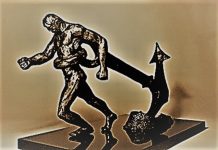The natural man is scandalised by the things of God.
Behold, I am laying in Zion a stone of stumbling, and rock of offense …
Romans 9:33
The school of the Spirit is pre-eminently a ‘school for scandal’.
Whenever God visits the earth he does it contrary to our patterns and expectations. He does not fit our preconceived notions of who we think he is and of how he should do it.
Even though he is the God that never changes, he is always original. This is reflected in 8 billion people who currently inhabit the earth – all one humanity – but not one identical to another. Every creative act of God, and therefore every visitation and operation of his Spirit, while characterised by similarities, will always be unique.
And so, everything God does is the same – and yet, always different.
So, how do we respond to this?
Domesticating God
We are not at ease with a God who can act unilaterally, who can be totally independent, and therefore totally unpredictable.
Consequently, we turn to his immutability. There is something in our fallen nature that misconstrues the fact that God never changes—we unconsciously figure he is predictable, and therefore controllable. And without realising it we have domesticated God—we have made him safe. In fact, we make a god in our own image—becoming so safe he exists only to indulge our happiness. He is harnessed – at least in our minds – to bless our endeavours and guarantee our effectiveness—a mere means to an end.
The scandalon
Now, if we become so entrenched in the predictability of our notion of God, when he does something outside of it we are shocked—in fact, so offended we are ‘scandalised’. This is why Jesus is called “the rock of offence” (also 1 Pet 2:8; 1 Cor 1:23; Gal 5:11). The New Testament Greek word for `offence’ is skandalon, from which we derive our English word `scandal’. It originally referred to “the part of a trap to which the bait is attached, hence, the trap or snare itself”.
And so, whenever God does something contrary to our defective or incomplete image of him we are offended; and consequently ensnared—hindered from further development in God. It is imperative we understand this is more than being offended by unusual manifestations of the Spirit during times of spiritual refreshing and revival. It may include this, but is much more; it is also more than a nominal espousal of a correct doctrine of God’s nature and attributes.
Our image of God
It has to do with the image of God imprinted within us. This can come as a false image, formed through the programming of the ‘old self’ (literally ‘old man’)—that is, our common identity in Adam and the source of our fallen nature (Eph 4:22; Col 3:9). Or it may come as the true image of God through the renewing of the mind—through the word and the Spirit thoroughly and progressively renovating every corner of our being (Eph 4:22-23; Rom 12:1-2).
So every day of every week of every year God is coming to us through a very unique and personal set of circumstances. These are designed to do one thing: conform us to his image. As Paul explained, “…it is God who is at work within you, both to will and do of his good pleasure…so that you may become…” (Phil 2:13, 15).
God is working in our lives to bring down every image – or imagination – raised up against the knowledge of him (2 Cor 10:3-5). Every circumstance comes with God-designed intent—to change our preconceived notions of who we think he is and how we think he should work.
And as we are shocked and offended by God doing it his way, we are faced with two possibilities: we either indulge the old programming – the old imprint of who we thought God was – and are scandalised – ensnared by the offence – and thus withheld from moving on in God; or, through repentance and brokenness, bowing to the wisdom and majesty of God, we move out to the prophetic edge and grow in our experiential knowledge of who he actually is.
Let’s have a look at how this works in practice.
Peter scandalised by Christ’s death
Jesus had just predicted his suffering and death. Shocked, Peter took him aside and began to rebuke him saying, “Never….This will never happen to you!” Jesus’ response is a shock, but deeply instructive: “Get behind me Satan! You are a stumbling block to me; you do not have in mind the things of God, but the things of men” (Mtt 16:23).
Wow! This is the guy who a few moments earlier received the download that this Jesus was the Christ, the Son of the living God! (v.16). Now Jesus is calling him, “Satan”! How easily we swing from moving in the Spirit one moment and to the flesh the next. And we unwittingly become Satan’s tool, potentially obstructing the eternal purpose of God.
Jesus didn’t mince words: “You are a stumbling block (scandalon) to me”. Frighteningly, Peter, scandalised by this “rock of offence” (scandalon), has become one himself. When we are scandalised by the ways of God we not only hinder the will of God in our own lives, but also become a stumbling block to others. We obstruct the purpose of God. Fitting the description of the Pharisees, we neither enter ourselves, nor allow others to enter the kingdom (Mtt 23:13- 14).
Now, how did Peter come to this point? Through having “in mind the things of men, rather than the things of God”. In other words, he was viewing Christ and his death through natural reasoning, through a human grid—the old programming and imprint of who he thought God was. Jesus’ death just didn’t make sense. He was the Messiah, the promised saviour and deliverer: he couldn’t die. From a Jewish perspective the Messiah was a political deliverer, sent to liberate them from the Roman yoke and bring the promised kingdom. How could this occur if he was killed? But as Jesus explained to Pilate, “My kingdom is not of this world. If it were, my servants would fight to prevent my arrest … But now my kingdom is from another place” (Jn 18:36).
Through the conditioning of Peter’s Jewish nurturing – as with all the disciples – he possessed certain notions about the Messiah and his task.
This is true of every disciple of every age. We have our preconceived notions about God and his workings from our churches and religious culture; from our denominational – Pentecostal, Evangelical, or Liturgical – patterns; or from our own temperament and personal preferences. These are programmed into us and are second nature. Therefore, without our preconceptions and natural reasoning being confronted we reduce the kingdom to something “from this world”—something that is predictable and domesticated.
Scandalised by extravagant love
This is the case with the current emphasis of the Spirit on the first and Great Commandment loving the Lord with all our heart, soul, mind, and strength (Mk 12:29-31).
Observing some trends in various quarters, I discussed this issue over coffee recently with a good friend who is a respected apostolic implementer in our nation to get his perspective. As we wrestled with it he understandably came from his concern for the how (i.e. ministry practice) and I from the prophetic imperative of the who (i.e. worship integrity).
Without ignoring the first, he focussed on the second aspect of the Great Commandment, which Jesus said is like the first—”to love our neighbour”. Mine was on the first—”to love the Lord…”. One emphasis looks for the practical outworking in ministry to others, feeling that an over emphasis on the other will be impractical; while the other says, no, we need to maintain our focus on God.
How do we resolve this? When human wisdom dominates we try to make sense of an apparent contradiction. We appeal to `balance’ between the two extremes. However, in light of the biblical revelation of God, we agreed that he is not a God of balance, but of extremes—he is extreme about us loving him and extreme about us loving others.
Human wisdom is never comfortable with a paradox: to live we must die, to be great we must be the servants of all, and in this case, to love our neighbour we must love God. In each case the paradox swings on the hinge of a radical obedience.
But this is where we stumble. The natural man is scandalised by the things of God. Human thinking says, “But if I radically love God I’ll be irrelevant to the world – it’s impractical – we’ll never reach our ministry goals”. But God says, “No, obey me, and trust me for the outworking”.
Oswald Chambers says it well:
“So often we mar God’s designed influence through us by our self- conscious effort to be … useful. Jesus says there is only one way to develop spiritually, and that is by concentration on God. `Do not bother about being of use to others; believe on Me.’ Pay attention to the Source, and out of you will flow rivers of living water. We cannot get at the springs of our natural life by common sense, and Jesus is teaching that growth in spiritual life does not depend on our watching it, but on concentration on our Father in heaven.”
The Desert Fathers
During the 3rd century, in response to the spiritual decline of the church, many lay people began to move out into the Egyptian desert to be alone with God. They moved in radical obedience to the Great Commandment, becoming known as the `Desert Fathers’. One of these was a man, Simeon Stylites, who, sort by crowds and looking for greater seclusion, moved from his cave to a platform on the top of a 60′ tower. He remained there for the next 36 years of his life! In response our natural reasoning says, “These guys were crazy!” But let’s see what happened. Fleeing to the desert in their pursuit of God tens of thousands flocked to either join them or benefit from their counsel. Stylites in particular saw an unusual harvest of souls as he preached to thousands from his tower.
From this was born the entire monastic movement. While admittedly there were flaws in this movement God used it to reform the church, preserving spirituality, the Scriptures, and other sacred writings. Through it ministry to the poor, medical care, hospitality, protection of the outcast, biblical scholarship, education, and agricultural advances were all achieved. And eventually the Reformation itself was sparked through an Augustinian monk, Martin Luther.
Now, did they go to the desert calculating, “If I do this and thus…this and that will happen”? “If I build a tower it will attract thousands”. Absolutely not! Their singular concentration was on God without thought to their ministry effectiveness.
Authentic spiritual impact in the world will only occur to the degree we are extravagant toward God.
Herrnhut – The Lord’s Watch
In 1727 led by von Zinzendorf in Herrnhut, Saxony, the Moravians gave themselves to ‘the Lord’s watch’—to 24/7 prayer. But by 1739 they were instrumental in the conversion of John and Charles Wesley, releasing the wave of the Spirit we now know as the Evangelical Revival throughout Great Britain and the birth of the modern missionary movement.
Remember that Martha and Judas were both scandalised by the extravagance of Mary’s love. However, they were not so much scandalised by the fact of her love, but by its impracticality; Martha preoccupied with activity and Judas with economy. Surely, these are the two stumbling blocks confronting us in the church today—activity valued over adoration, and economy over exaltation.
Loving God always defies common sense.
It is time again for extreme obedience — to love the Lord our God with all our heart, soul, mind, and strength.
by David Orton, May 19, 2003
Such a Now word written 17 years ago! JLB










































[…] no punishment. It’s an act of pure grace that wins her heart and a demonstration of perfect love that she willingly and joyfully reciprocates: “We love him, because he first loved […]
[…] no punishment. It’s an act of pure grace that wins her heart and a demonstration of perfect love that she willingly and joyfully reciprocates: “We love him, because he first loved […]